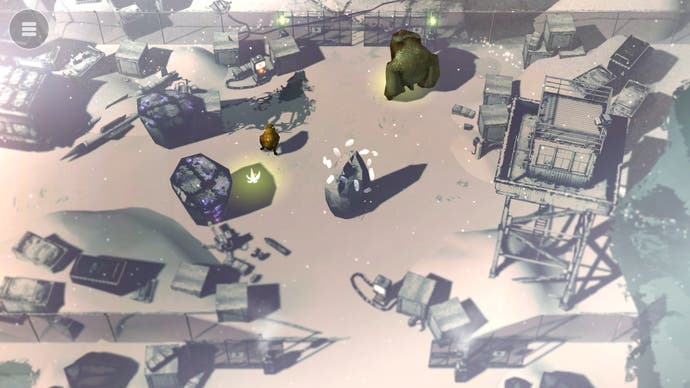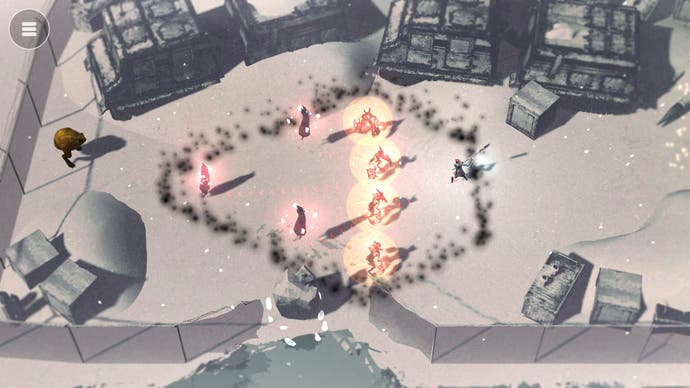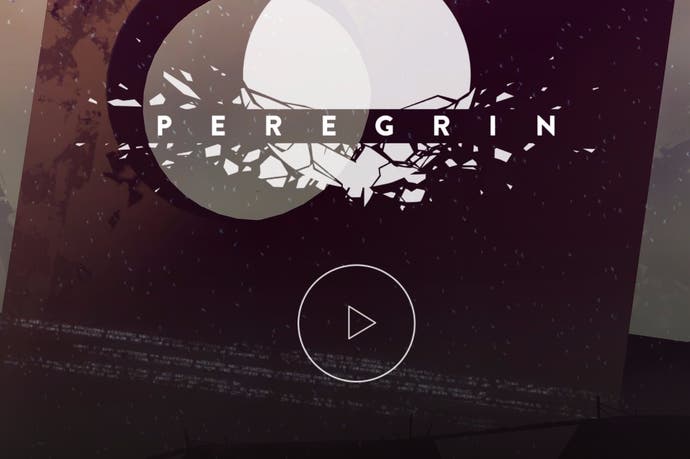Wasteland puzzler Peregrin won't stop talking over itself
The bird is the word.
A terrible force stalks the wilds of Peregrin, unseen but inescapable, its shadow falling across every beautifully weathered nugget of wasteland art. No, I'm not talking about the demonic Guardians you'll face as you sift through the wreckage of yet another extinguished civilisation. No, I'm not talking about the playable character, Abi - a young woman with a long scarf, a big stick and the ability to possess other creatures, on a mission to appease the gods responsible for the devastation. I'm talking about the script. It just won't leave you alone. To enter an area, approach any striking object, or even just cross the middle of the screen in Peregrin is to risk attracting the attention of either the narrator or a radio contact back home.
It's not just that the prose itself is slightly dreary fantasy hokum - I have an inhumanly high tolerance for this kind of thing. It's that the writing actively gets in your way, moment to moment. Sometimes the narration is just utterly redundant, describing things like doors opening or lights changing colour in a manner more befitting of a funeral oration. This grows worse when the narrator has to vocalise certain events repeatedly, like when somebody calls you on your comms unit. A buzzing tone would have done the job just fine, but here we are with such ornamental overtures as "the crackle of an incoming signal pierces the silence".

Worst of all are the moments when the game tries to dictate your emotional responses to the landscapes you traverse, stealing thunder from its own, nicely wintry art direction and languorous orchestral score. "Seeing the twisted metal and torn earth before her sends a shudder down her spine," the narrator observes at one point, as you're trying to take in the view. It's like being on holiday with that one over-eager family member who insists on yelling "isn't this nice?" whenever there's a lull in conversation. OK dad, how about you go get the sandwiches and we'll see you on the other side of the beach?
Evade the script's clutches for long enough and you'll discover a fun if rather plodding puzzle game, in which you possess creatures to either fight each other or manipulate the environment. A simple scenario might involve using a troll to lug a boulder in front of a sentry turret (as per ancient civilisations in games at large, all the automated defences are in perfect working condition), then possessing a goat to knock down a drawbridge. First, though, you'll need to activate a nearby totem - neutral creatures can only be possessed when they stand inside a totem's aura. Combat (which pauses time between actions) adds a bit more crackle: you'll need to mindjack Guardians in the right order before they run you down, pitting skirmishers against one another and using ranged units to neutralise wizards that can shield their allies.

I can well imagine some great puzzles using these components towards the finish, but I doubt I'll get there - the writing is too irritating. It's a shame, because the landscapes are lovely - murky and weather-beaten yet capable of some arresting nuances, like the contrast between snowed-over and bare surfaces. Some of the more impressive backdrops recall PlayDead's LIMBO and Inside, dominated by enormous, arcane monoliths and the hulks of crashed missiles. On paper the story has a certain intrigue, too - in the course of unpicking the mysteries of a vanquished society, Abi must also deal with the gradual erosion of her own memories, the sacrifice the realm's deities impose for traversing their sanctuary.
If only more of that was left implicit, rather than drummed into your ears at every turn. Peregrin feels like it's reaching for the same avuncular ambiance as Bastion, with a narrator who adds colour to the doings of a character you behold from on high, but where Bastion's dynamic narrative elements are amusing and poignant, Peregrin's are simply wearing. There's a lot of craft in this game, but it's more of a cautionary tale about over-writing than a tale of adventure after the end of the world.

